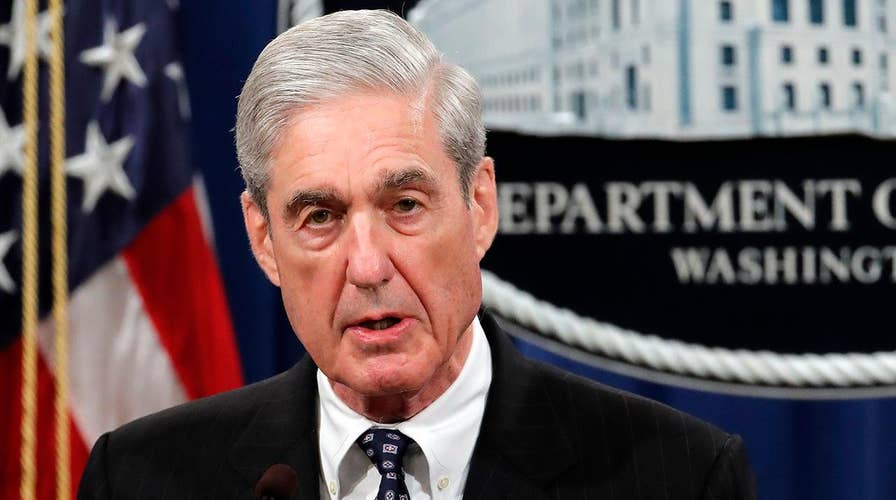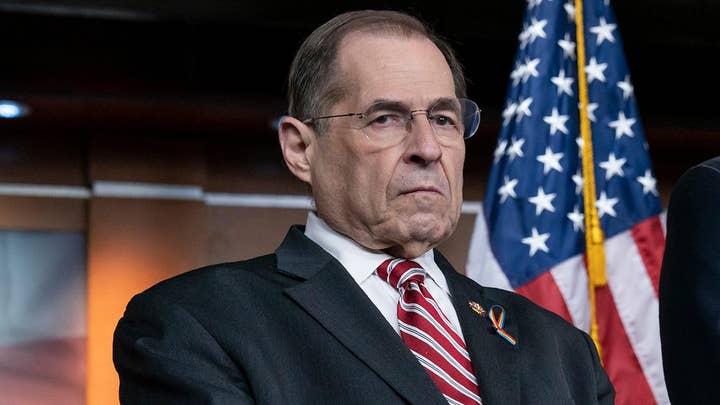House Democrats prepping new subpoenas for 12 witnesses in Mueller probe
Democrats on the House Judiciary Committee are expected to sign off on a dozen subpoenas for current and former Trump staffers including Rod Rosenstein, John Kelly, Michael Flynn and Jared Kushner; Catherine Herridge reports.
The House Judiciary Committee voted along party lines Thursday to authorize subpoenas for a slew of high-profile individuals associated with President Trump as part of the panel’s investigation into obstruction of justice and other alleged abuses by the president -- as Republicans decried what they called a "subpoena binge."
The 21-12 vote followed a tense committee meeting, where lawmakers clashed over the ever-escalating probe into the Trump administration as well as the format for former Special Counsel Robert Mueller’s scheduled testimony before the panel next week. Details of that hearing remain unclear.
Committee Chairman Jerrold Nadler, D-N.Y., also vowed to authorize subpoenas for current and former administration officials related to Trump immigration policies, specifically those who were involved with the implementation of the “Zero Tolerance” policy and other family separation practices.
But some of the highest-profile figures were targeted in connection with the obstruction inquiry.
“These 12 subpoenas relate to the committee’s ongoing investigation into allegations of obstruction of justice, public corruption, and abuses of power, including such conduct described within the scope of the Mueller report,” Nadler said in his opening statement Thursday. “The Committee on the Judiciary has a constitutional obligation to investigate credible allegations of misconduct.”
Nadler said “there is no substitute for primary evidence” during the committee’s investigation, and noted the committee has previously sought documents and testimony from several on the list.
“These include government officials who worked (or continue to work) in close proximity to the president. These witnesses also include those outside of government who have critical information in connection with our investigation,” he said.
The individuals subject to fresh subpoena are: former Attorney General Jeff Sessions; former Deputy Attorney General Rod Rosenstein; Trump son-in-law Jared Kushner; former White House National Security Adviser Michael Flynn; former White House Deputy Chief of Staff Rick Dearborn; former White House Chief of Staff John Kelly; former Trump campaign manager Corey Lewandowski; former White House aide Rob Porter; publisher of the National Enquirer David Pecker and chief content officer Dylan Howard; former Stormy Daniels lawyer Keith Davidson; and Assistant Attorney General Joseph “Jody” Hunt.
But committee Ranking Member Doug Collins, R-Ga., blasted Nadler and Democrats for using subpoenas to “begin a dialogue process.”
“Here we go again for another episode of premature subpoena authorizations, brought to you by the Democrats on the House Judiciary Committee,” Collins said. “The chairman wants to continue his subpoena binge and issue an additional twelve subpoenas to individuals related to the Mueller investigation.”
Collins said that Nadler “has had no formal contacts” with several of the individuals he plans to subpoena.
“In the world of congressional oversight, these subpoenas make no sense at all,” Collins said. “But in the world of politics, today’s markup makes perfect sense.”
Rep. Steven Cohen, D-Tenn., defended the move to subpoena, saying these individuals are “the best witnesses” and will provide “the best evidence for obstruction of justice.” Cohen also claimed they are all “direct witnesses to crimes.”
“This committee has the responsibility to bring them forth if they exist to the American people,” Cohen said.
Earlier this year, Nadler made a sweeping request for documents as part of the expansive Trump probe, calling for responses from 81 agencies, entities and individuals. Nadler sent document requests to the majority of the individuals the committee plans to subpoena, including Kushner, Flynn, Sessions, Lewandowski, and others. In March, a GOP source on the committee told Fox News that only a small group had provided documents and met the Nadler-imposed deadline.
“I remain open to reaching a reasonable accommodation and will not issue subpoenas if the information we are seeking is voluntarily provided,” Nadler said this week. “We will get answers one way or the other.”
Nadler’s committee has also been locked in battle with the Trump administration on other fronts, voting to hold current and former Trump administration officials in contempt for defying congressionally issued subpoenas. In April, Trump vowed to block any and all subpoenas against members of his administration.
“We’re fighting all of the subpoenas,” Trump said in April. “Look, these aren’t like, impartial people. They are Democrats trying to win in 2020…They’re not going to win against me.”
He added, at the time, that “the only way they can luck out is by constantly going after me on nonsense.”
Sparks also flew over the structure and format of Mueller’s public hearing, which is scheduled to take place next Wednesday.
At this point, the plan is for him to testify in public before the House Judiciary Committee for two hours or more, followed by another two hours-plus of testimony before the House Intelligence Committee in an open setting.
But Democrats on Wednesday said that discussions about the structure of the hearing were still “in flux,” and some freshman lawmakers expressed concern over the possibility that they would not have the opportunity to question the former special counsel.
“Mr. Chairman, I’m really disappointed I won’t be able to ask questions of Special Counsel Mueller,” freshman Rep. Guy Reschenthaler, a former prosecutor and judge, said Thursday. “It is also hypocritical to let the witness dictate terms to us….I think it makes us look weak.”
Collins said the panel was "rolled" and is "having our legs cut out from under us by limiting the questioning." Arizona Rep. Debbie Lesko, a junior Republican on the panel, said the decision to exclude some members from questioning is "just plain wrong."
"I have been elected just like anyone else here," she said, speculating that she'd be one of the members cut out.
The Associated Press contributed to this report.
















































